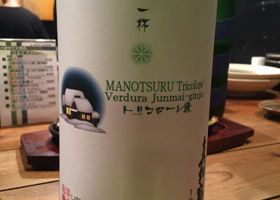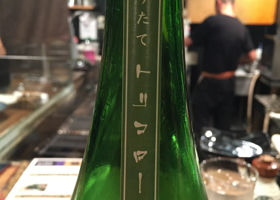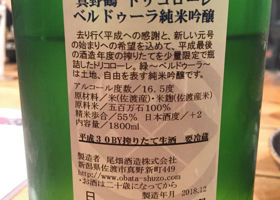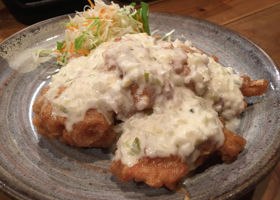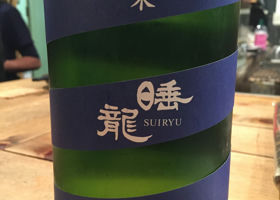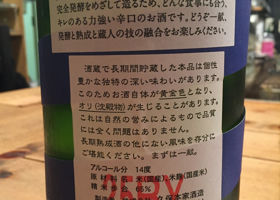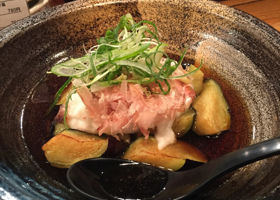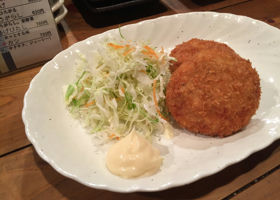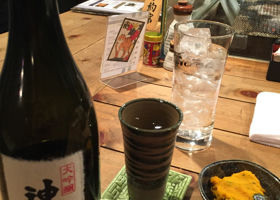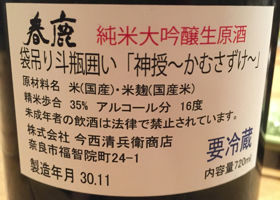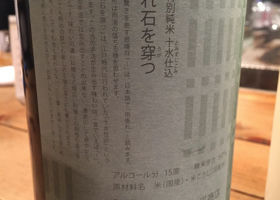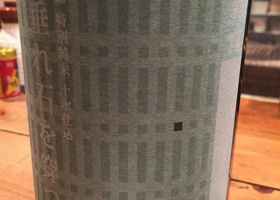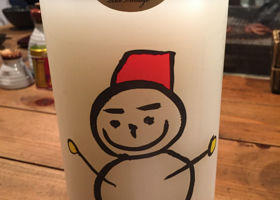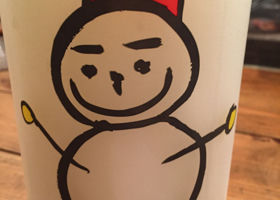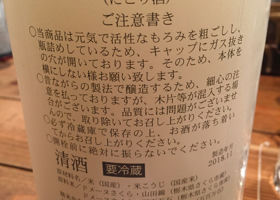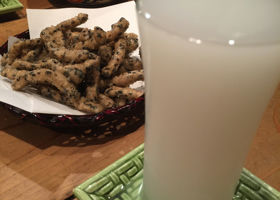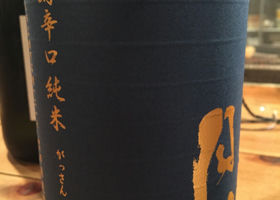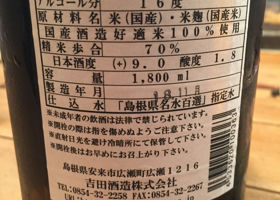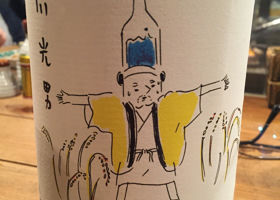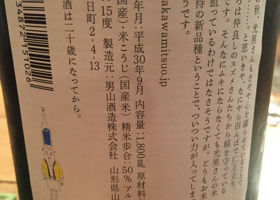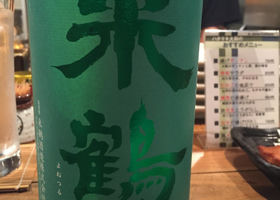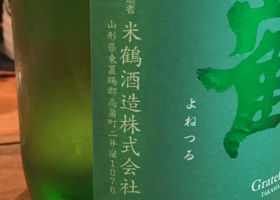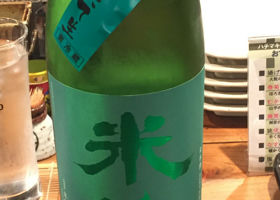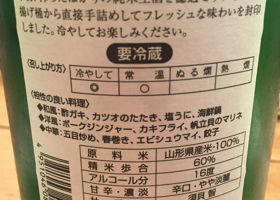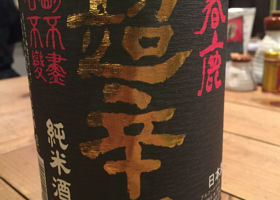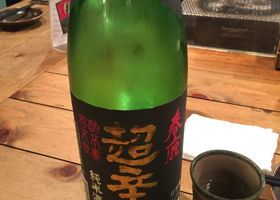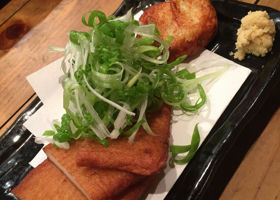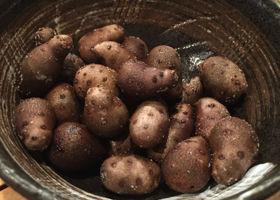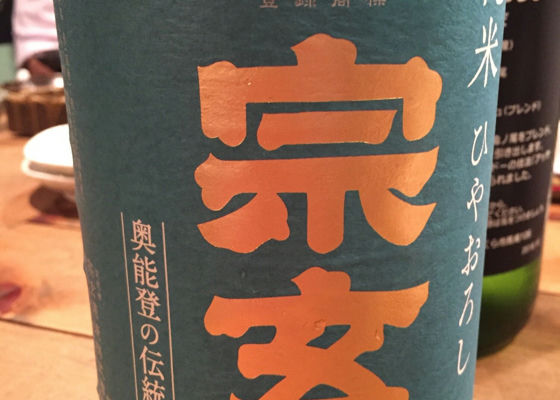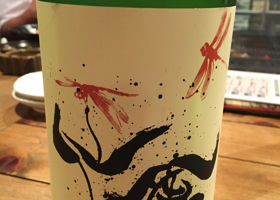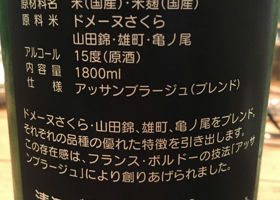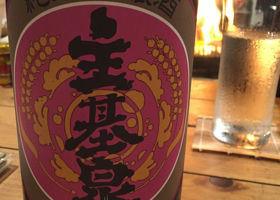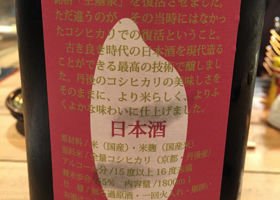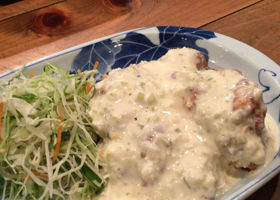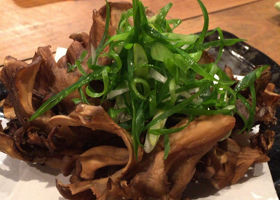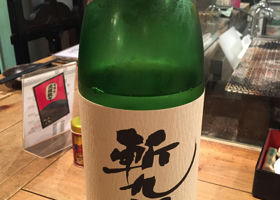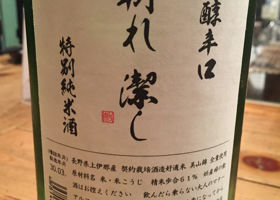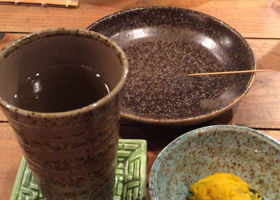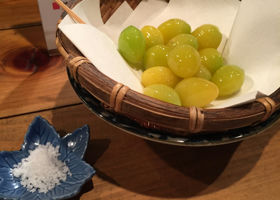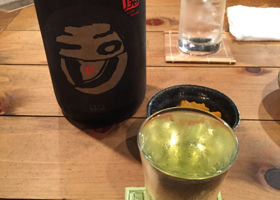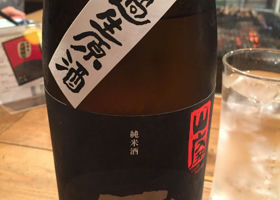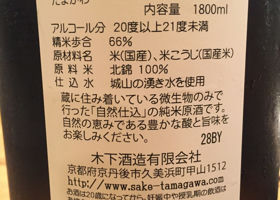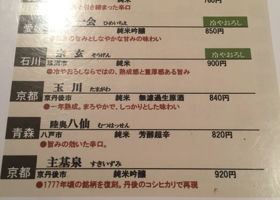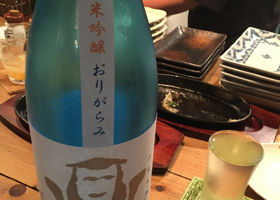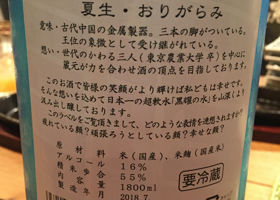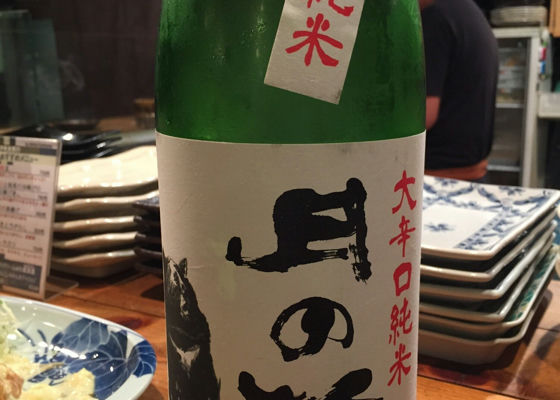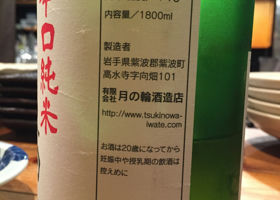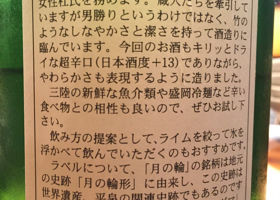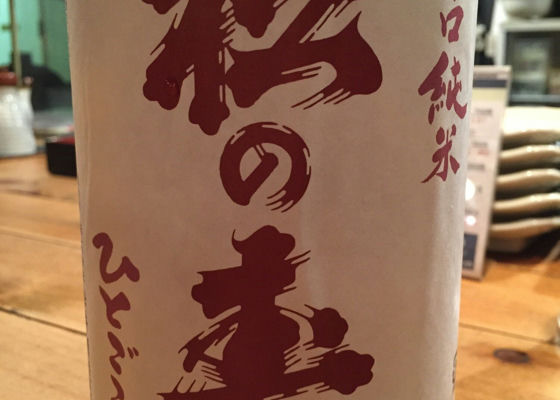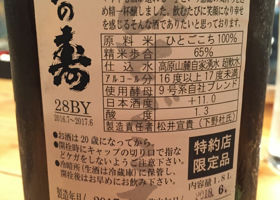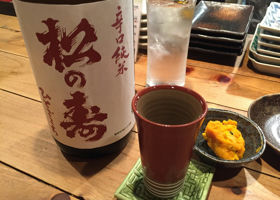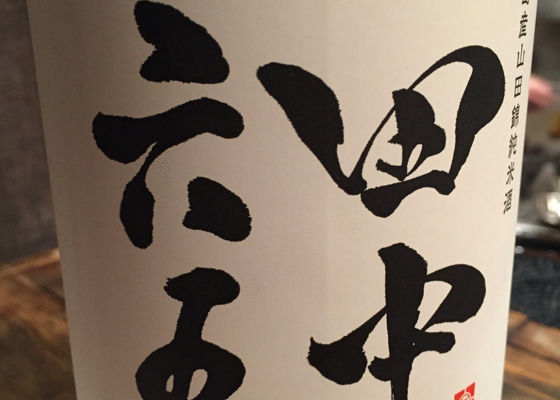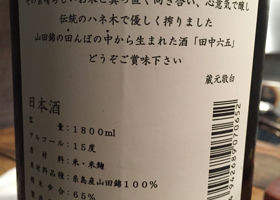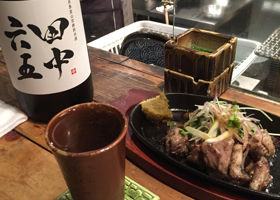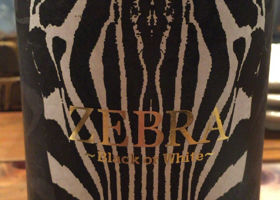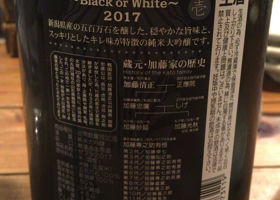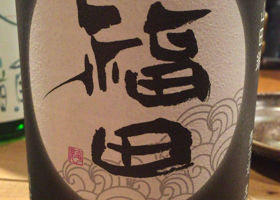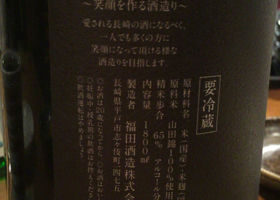Timeline
田中 楽In January 2019, as the second drink of the day at Shibuya's Toramikan, I was served with chicken nanban... or, for sake lovers, chicken nanban is an accompaniment to...
The brewer is Obata Sake Brewery in Sado City, Niigata Prefecture. Manotsuru" is the company's main brand. This junmai ginjo is made from 100% Gohyakumangoku produced on Sado Island. This sake celebrates the transition from the Heisei era to the 2025 era. It is bottled in a green bottle, perhaps in reference to its "Verdura" (green) name. Rosso (red)" is also on sale and is packaged in a red bottle. Bianco (white)" is a junmai activated nigori sake. The bottle was white, of course.
(Reference)
https://toshihikosato.livedoor.blog/archives/51819398.html
(company's website)
https://www.obata-shuzo.com/home/ 田中 楽January 2019, at the Tiger's Head in Shibuya. I went there with my colleagues from work so we were able to try many different things.
The first drink of the day was "Sairyu". The brewer is Kubohonke Shuzo Co. in Uda City, Nara Prefecture. The brewery is a long-established business with a history of more than 300 years since the Edo Genroku period (1688-1868).
The sake is brewed with the aim of "perfect fermentation," so it goes well with all kinds of food. The dishes served with good sake are even more delicious.
https://kubohonke.com/ 田中 楽Drinking alone on Christmas Day, December 2018, at Tiger's Creed in Shibuya, Tokyo. I am devastated.
The label "Fukuro-hozuri tobin-oi" and the rice polishing ratio of 35% are eye-catching.
The brewer is Imanishi Seibei Shoten, located in Fukuchiin Town, Nara Prefecture.
It was Christmas, so we decided to sip a sake called "Shinju," though not necessarily in opposition to the Western gods. It is one of the brands of this brewery's brand "Harushika," and when I checked online, a 720 ml bottle of 2020 was priced at 6,600 yen and a 1.8 L bottle at 1,3200 yen. Wildly speaking, if we were to serve a glass at "that price" at this restaurant, we might possibly be in the red or even tonton. We had a good sake at the end of the year. 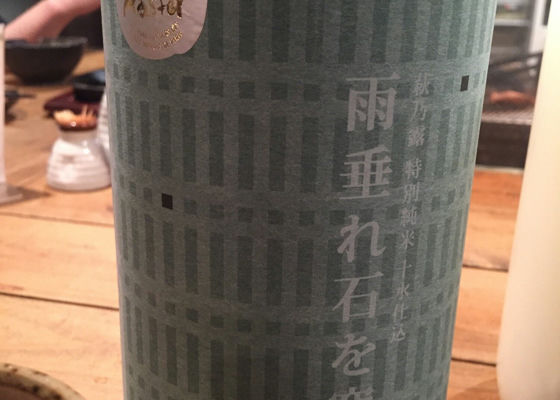
田中 楽November 2018, as the sixth drink of the day at Tora Vigilante in Shibuya, Tokyo.
The brewer is Fukui Yahei Shoten Co. in Takashima City, Shiga Prefecture. It is a special junmai sake made using the "jumizu-shikomi" method. According to an Internet search, "jumizu-shikomi" is a method of brewing in a thicker state using less water than modern brewing methods.
The brewery's brand "Haginoro-rou" has an unusual name, "Ame-dare-ishi wo tsuki" ("piercing the dripping stone") as a sub-brand of "Haginorou," and the gray pattern laid out on the label represents an exclamation mark "! The gray pattern on the label represents the exclamation mark "!
As a proverb, it is also said, "Dripping drops of rain pierce rocks (stones)," meaning "just as dripping drops of rain pierce stones over a long period of time, even small things can accomplish big things if you persevere" (a proverb with a similar meaning is "Koke no ichinen iwa wo mukete" ("Even a small thought of a false idea can pierce a rock")). We feel that this name also expresses our desire to brew sake with care. Senkin雪だるま しぼりたて活性にごり酒生酒にごり酒発泡 田中 楽November 2018, as the fifth drink of the day at Shibuya's Tiger's Bird's Nest.
This sake, with its impressive illustration of a large snowman, is one of the brands of Senkou, a brand of Senkin Co. in Sakura City, Tochigi Prefecture (search for "snowman" and you'll find many articles about it).
Because it comes in a transparent bottle rather than a label, the snowman looks stylish and cute standing in the background against the white of the nigori sake.
Because of its effervescent nature, there is a vent hole in the cap, and the introductory articles in sake stores and other stores say that it is not suitable for gift-giving because of the possibility of leakage. If stored at room temperature, it seems that it may spurt out through the hole.
*From the ingredients and rice polishing ratio, it is equivalent to Junmai Daiginjo, but since there is no indication on the bottle, no tag is attached. 田中 楽November 2018, as the fourth drink of the day at the Tora Shukan in Shibuya.
The brewery is Yoshida Shuzo Co. in Yasugi City, Shimane Prefecture, famous for Yasugibushi. The brewery is located in Yasugi City, Shimane Prefecture, famous for Yasugibushi (a traditional Japanese folk song).
https://e-gassan.co.jp/ 田中 楽November 2018, as the third drink of the day at Tora Shikan in Shibuya.
The "Yamakawa Mitsuo" is a unit of four breweries in Yamagata Prefecture, named after one of their brands ("Yamagata" Masamune, "Tateno" River, "Higashi" Hikaru, and "Otoko" Mountain). 2018 Fall is the ninth in the series, produced by Otokoyama Sake Brewery Co. According to information picked up online, this is the first junmai daiginjo in this series brewed with 100% Yamagata Prefecture-produced "Yuki-Majin" rice suitable for sake brewing. The yeast used is mainly Association No. 6 yeast. It has been fire-aged.
(Project HP)
http://yamakawamitsuo.jp/
田中 楽November 2018, as the second drink of the day, at Tiger's Brewery in Shibuya.
The brewery is Yonetsuru Sake Brewery Co. in Takahata-machi, Yamagata Prefecture. I like Yamagata rice and prefer my sake dry, so the label has an appealing statement for me. When I looked it up on the Internet, I found that it is described as "a limited edition of 1,900 bottles produced by brewer Mr. Yazaki and sold only at a limited number of local sake specialty stores. 田中 楽November 2018, at the usual Tora Basho, with satsuma-age and mukago as accompaniments.
I had failed to get the label, so this is the information I found on the internet.
The brewery is Imanishi Seibei Shoten in Nara Prefecture. It is a sake brewery founded in 1884. Super Dry" is the brewery's best-selling brand and has been for over 35 years.
The characters on the neck label read "Nanto Morohaku," with "Nanto" referring to Nara and "Morohaku" referring to the "sake brewing using only white rice," which was invented in the Muromachi period (1336-1573) by the monks of Kofukuji Temple. It is a sake that carries on this tradition to the present.
https://www.harushika.com/fs/harushika/c/cho-karakuchi/ 田中 楽October 2018, as the fourth drink of the day at the usual Tiger's Brewery.
The brewery is Sogen Shuzo Co. in Suzu City, Ishikawa Prefecture. It is a long-established company founded in 1768.
I didn't take a proper picture of the label, so I looked it up on the Internet and found that it seems to be a junmai sake. The description says, "All Hachitan-Nishiki produced in Hiroshima Prefecture is polished to 55% and carefully brewed in small batches, then matured over the summer.
https://sougen-shuzou.com/wordpress/?cat=5 田中 楽October 2018, as the third drink of the day at the usual tiger's nest.
The brewer is SENKIN Co. in Sakura City, Tochigi Prefecture. At first, I couldn't read the brush strokes on the label, but it was a corrupted version of "Senkou". I could not read it at first, but it was a broken character of "Senkou," with an illustration of a red dragonfly on it.
I have never seen such a large number of rice varieties listed as ingredients, but as explained on the label, it seems to incorporate the winemaking technique of "assemblage (blending)". I rather like breweries that take on new challenges and try to create something unique. 田中 楽October 2018, at the usual Tiger's Banquet.
I went for a drink with my colleagues at work that day and ordered 4 drinks for convenience. This is the second of those drinks. Ginkgo followed by maitake mushrooms, which are in season.
This is Suki-Izumi, which we were not able to drink on our previous visit. The brewer is Shirasugi Shuzo Co. in Kyotango City, Kyoto Prefecture.
I had never heard of the term "bottle enclosure," so I looked it up and found that it means "bottling and storing in bottles to manage the aging process. It means that it is easy to produce high quality products". It also says, "The difference with storage in tanks is that it is easier to determine the degree of maturity because it is managed in small units (1 shou bottles), and it is easier to produce high quality products because the area exposed to the air is relatively small. Compared to room temperature aging at room temperature in a warehouse, such as during the summer, the bottles have the advantage that they can be easily managed in a refrigerator or moved around. (I tagged "tobin-tori," which is semantically close to "tobin-tori," but please point out if I'm wrong).
(I refer you to this blog)
https://ameblo.jp/sakurasakeshop/entry-12304829706.html 田中 楽October 2018, at the usual tiger's eye. Together with seasonal ginkgo.
The brewer is "Limited Partnership Miyajima Sake Brewery" in Ina City, Nagano Prefecture. I am attracted by the simple but impactful label and text. 田中 楽October 2018, at the usual Shibuya Tiger's Brewery.
The brewery is Kinoshita Shuzo Co. in Kyotango City, Kyoto Prefecture.
This sake is an unfiltered, unfiltered, unfiltered, unfiltered, unfiltered, unfiltered, unfiltered, unfiltered, unfiltered, unfiltered sake. There was also another Kyotango City brewery, Chiki-Sen, in the lineup that day, but I didn't get to drink it that day. 田中 楽August 2018, as the second drink of the day at the Tora Shikan in Shibuya.
I failed to take a picture, but the brewery is Shinshu Meisho in Ueda City, Nagano Prefecture.
The product data I picked up online is as follows
**************************************************************
Alcohol percentage (%) 16
Rice polishing ratio (%) 55
Sake meter (%) ±0
Acidity 1.7
Taste: Somewhat sweet
Drinking temperature: Cold / Room temperature
Rice: Miyamanishiki / Water: Kuroyau water 田中 楽August 2018, at the usual Shibuya Tiger's Brewery.
The brewery is Tsukinowa Sake Brewery Ltd. in Shiwa-machi, Iwate Prefecture. It was founded in 1886 (Meiji 19).
https://www.tsukinowa-iwate.com/
The comment on the website about the "Dai-harakuchi Junmai" is "Super-harakuchi but also soft, recommended as a food sake. It is recommended as a food sake. It is recommended as an in-between-dinner drink. 田中 楽In July 2018, at the usual Tora Shukan.
The brewer is Matsui Shuzoten, Shioya-machi, Tochigi. This "Dry Junmai" is a limited edition for special dealers. The rice used to make it, Hitogokochi, is a relatively new variety. According to a description found on the Internet, "Hitogochi was first bred at the Nagano Prefectural Agricultural Experiment Station in 1987, and in 1995, an application for registration of seeds and seedlings was filed and trial brewing began at the Nagano Sake Brewers Association. The Nagano Prefectural Sake Brewers Association began test brewing the sake.
https://sakeconcierge.com/hitogokochi-genealogy-of-sake-rice/
Specs are here
https://www.kanese.com/SHOP/10426.html 田中 楽March 2018, at the usual tiger's eye view.
The brewery is Shiraito Shuzo Ltd. in Itoshima City, Fukuoka Prefecture. Itoshima City was a well-known producer of Yamadanishiki, wasn't it?
The name "Tanaka" made me feel familiar with it, so I ordered it. The "Tanaka" in "Tanaka Rokuugo" comes from the fact that the brewery is located in a rice paddy. Rokugo" is neither a pseudonym derived from the age of the brewer like Naoki Sanjuugo nor a stage name like Egashira 2:50, but is derived from the 65% rice polishing ratio. It is characterized by the use of a traditional method called "hanegi shibori" (pressing with a spring wood press) during the top-filling of the tank.
http://www.shiraito.com/tanaka-65/ 田中 楽March 3, 2018, as the third drink of the day at Tora Vigilantes in Shibuya.
The brewer is Fuji Shuzo Co. of Tsuruoka City, Yamagata Prefecture; we had had this in November 2017, so this was a re-release of the same brand in a short interval, which is unusual for Tora Vigilantist. This Junmai Daiginjo uses Niigata Prefecture's "Gohyakumangoku" rice for the sake rice.
The label was renewed in 2017 with a zebra design that has a strong impact, and at first glance you would not notice that it is a rebranded product of "Eiko Fuji". As for the reason for the "zebra" naming... I read a blog post where this sake was featured, but I couldn't quite figure it out (lol).
https://sake-wadaya.com/276/
The name seems to be an overlap between Zebras, which are herbivorous animals that support each other and survive in herds, and the more than 30 different brands of Eikoufuji sake.
田中 楽March 3, 2018, as the second brand of the day at the Shibuya Tiger Vulture.
The brewer is Fukuda Shuzo Co. in Hirado, Nagasaki, Kyushu. It is a pure, unfiltered, unpasteurized pure rice sake made from 100% Yamada Nishiki.
According to the website, there is a museum attached to the brewery, and factory tours are available.
https://www.fukuda-shuzo.com/ RecommendedContentsSectionView.title
